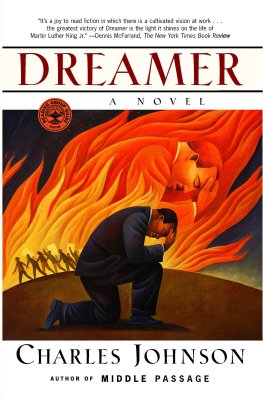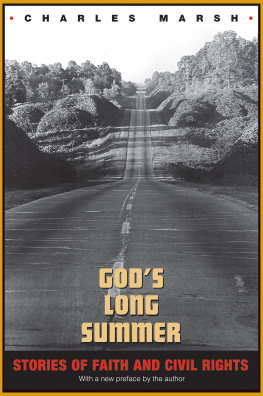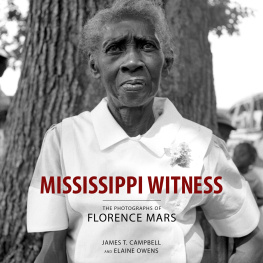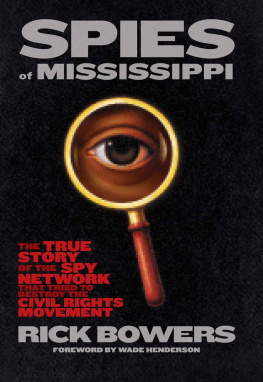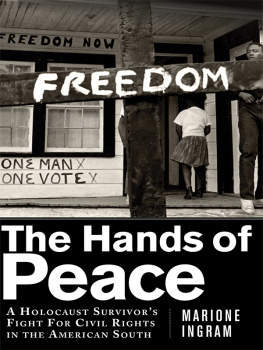CALLED TO THE FIRE
CHET BUSH
THE STORY of
DR. CHARLES JOHNSON
CALLED TO THE FIRE
A WITNESS for GOD IN MISSISSIPPI

CALLED TO THE FIRE
Copyright 2012 by Abingdon Press
All rights reserved.
No part of this work may be reproduced or transmitted in any form or by any means, electronic or mechanical, including photocopying and recording, or by any information storage or retrieval system, except as may be expressly permitted by the 1976 Copyright Act or in writing from the publisher. Requests for permission should be addressed to Abingdon Press, P.O. Box 801, 201 Eighth Avenue South, Nashville, TN 37202-0801 or sent to .
This book is printed on acid-free paper.
Library of Congress Cataloging-in-Publication Data
Bush, Chet.
Called to the fire: a witness for God in Mississippi: the story of Dr. Charles Johnson / Chet Bush.
p. cm.
ISBN 978-1-4267-5328-2 (hardback: alk. paper) 1. Johnson, Charles, 1938 March 5- 2. African AmericansCivil rightsMississippiHistory20th century. 3. African American clergyBiography. 4. Civil rights workersMississippiBiography. 5. Church of the NazareneUnited StatesClergyBiography. 6. Trials (Murder)MississippiMeridian. 7. MurderMississippiNeshoba CountyHistory20th century. 8. Civil rights workersCrimes againstMississippiNeshoba CountyHistory20th century. 9. MississippiRace relationsHistory20th century. I. Title.
E185.93.M6B88 2012
323.092dc23
[B}
2012038104
All scripture quotations, unless noted otherwise, are taken from the New Revised Standard Version of the Bible, copyright 1989, Division of Christian Education of the National Council of the Churches of Christ in the United States of America. Used by permission. All rights reserved.
Scripture quotations marked KJV are from the King James or Authorized Version of the Bible.
Quotations from Martin Luther King Jr. are reprinted by arrangement with The Heirs to the Estate of Martin Luther King Jr., c/o Writers House as agent for the proprietor New York, NY. Copyright 1963 Dr. Martin Luther King Jr.; copyright renewed 1991 Coretta Scott King.
Photo Credits: personal photos used with permission from Chet Bush, Becky Combs, and Charles Johnson.
12 13 14 15 16 17 18 19 20 2110 9 8 7 6 5 4 3 2 1
MANUFACTURED IN THE UNITED STATES OF AMERICA
CONTENTS
INTRODUCTION
THE WHOLE MAN
Charles Johnson did not intend to be a civil rights activist.
He was just being a good pastor.
He had no desire to move to Mississippi during the volatile 1960s. He did not set out to stand down the unjust systems of a segregated South, or get tangled up in a national civil rights case, or take up a mantle of activism for the African American community of Meridian. His passion flowed from a center more fiery than the furnace of racism. Charles Johnson knew that in order to be called to the fire one must first be called by the Fire.
Reverend Johnson lifted the heads of a people with little opportunity, few jobs, and no voice. The public education system failed them, the marketplace rejected them, and the justice system ignored them. While the powers-that-be worked to limit the African American vote in the public sphere, the preacher insisted each was elected to receive the love of God. They were, he assured, chosen for greatness in the kingdom of heaven and God wanted to empower their lives on earth. He worked to help the whole man.
Charles Johnson dignified a people by demanding justice for them. Charles Johnson dignified another people by demanding justice from them. This is the nature of prophetic speech and the effect of justice restored. Justice means to invite a healing to occur both in the life of an oppressed and an oppressor, for it is beneath the dignity of a fully whole person to treat another as a second-rate human.
Leaders like Charles Johnson are responsible for the progress our country has made toward living with respect for our neighbor. These changes did not come without sacrifice, however. The young minister soon discovered that operating out of the convictions of his heart would be costly, risky, and flat-out dangerous. Customs had to be challenged and laws had to be changed. This is now a nation of neighbors, friends, coworkers, church family, and indeed family, across lines that once divided it.
Charles has a hard time interpreting this faithful witness as heroic, however. Today, we tend to pick and choose the nature of activism for which we want to be known. For the black pastor in the South during the middle sixties, what we commonly call activism now was, then, simply survival.
As an African American pastor in those days you were either active or you just didnt care... werent concerned about your people. That was my philosophy about dealing with the whole man, the body, soul, and spirit. If I was going to help his soul, his heart, then I was going to have to work to better his whole life.
Over fifty years later Charles Johnson is still ministering in the same community, working for the same just outcomes and righteous rewards. He has ministered to thousands, inspired tens of thousands, and worked to change the lives of millions. The results of his obedience to God will continue and multiply for generations to come.
To know Charless story is to know the courage that is summoned in each one of us. The One who called Charles to the fire is calling each of us to pursue justice and righteousness and to live a life that is whole. It is a call that summons forth courage from the heart of the fearful, redeemed relationship for the socially broken, and trust in the One who is always faithful.
Charles, in the telling of his story, has elected to omit or obscure profanity from this book, including the spelling of one of the most offensive racial epithets of our time. The presence of this word is used to illustrate some of the attitudes and hateful speech that were part of the social milieu during the period of struggle for civil rights depicted in this book.
God at one and the same time upholds
a given political or economic system,
since some such system is required to support human life;
condemns that system insofar
as it is destructive of fully human life;
and presses for its transformation into a more humane order.
Conservatives stress the first,
revolutionaries the second, reformers the third.
The Christian is expected to hold together all three.
Walter Wink, The Powers That Be
CHAPTER 1
CALLED TO TESTIFY
... let us pray God will come, in a blotting out of sectional differences and racial animosities and suspicions, in a determination to administer absolute justice, in a willing obedience among all classes to the mandates of the law. This, coupled with our material prosperity, will bring into our beloved South a new heaven and a new earth.
~Booker T. Washington
Your Honor, the prosecution calls Reverend Charles Johnson to the witness stand.
A white police officer dressed in uniform khakis stepped across the hall to retrieve a small, wiry and dark man from a privately guarded room where he anxiously awaited his turn. From the back of the courtroom the deputy swung open one side of a wooden set of French doors that were tall, narrow, and stained a deep, dark brown. The officer self-consciously escorted the twenty-nine-year-old pastor through the center of a crowded room. All eyes turned to watch the witness enter. The place was packed with FBI agents, US Marshals, reporters, lawyers, defendants, and their supporters. The strangely jovial atmosphere turned malicious as the minister approached the bench.
Next page

